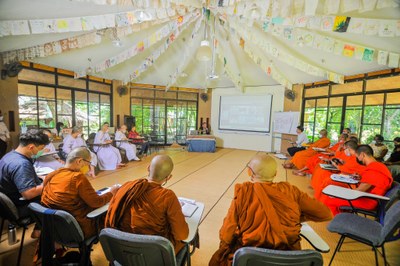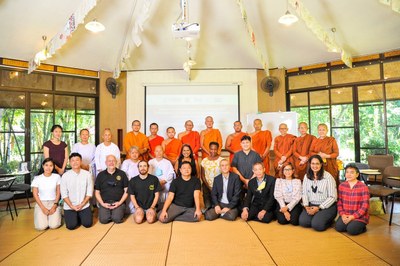USAID, DNP, and Buddhist Spiritual Leaders Spearhead Campaigns Countering Spiritual Beliefs Driving Wildlife Consumption in Thailand
The USAID Reducing Demand for Wildlife organized the workshop in partnership with the International Network of Engaged Buddhists (INEB), a global network of Buddhist organizations that has its Secretariat in Thailand. Workshop participants developed six campaigns to be implemented in communities across Thailand to engender reflection on spiritual beliefs that ivory and tiger products bring good luck and prevent harm. The workshop builds upon the earlier partnership with INEB initiated under the USAID Wildlife Asia project that mobilized nearly 100 monks and nuns from various temples across Thailand to champion the “No Ivory No Tiger Amulets” campaign jointly launched by USAID and DNP in March 2020. This campaign urges the public to refrain from using amulets from wildlife products.
 Monks and nuns who participated in the earlier workshops have since worked to promote the “No Ivory No Tiger Amulets” campaign with good results. Monks and nuns are major influencers of spiritual beliefs and have significant influence over local communities where such beliefs are most deeply held. Initiatives implemented over the past two years by the spiritual leaders have included elephant conservation projects such as building salt licks, wells, and dikes in the forest as food and water sources for wild elephants and other wildlife, and telling children folk tales relating to animal conservation. The new community campaigns developed and implemented by the monks and nuns as part of the workshop at Wong Sanit Ashram are expected to further reduce the demand for ivory and tiger products driven by spiritual beliefs.
Monks and nuns who participated in the earlier workshops have since worked to promote the “No Ivory No Tiger Amulets” campaign with good results. Monks and nuns are major influencers of spiritual beliefs and have significant influence over local communities where such beliefs are most deeply held. Initiatives implemented over the past two years by the spiritual leaders have included elephant conservation projects such as building salt licks, wells, and dikes in the forest as food and water sources for wild elephants and other wildlife, and telling children folk tales relating to animal conservation. The new community campaigns developed and implemented by the monks and nuns as part of the workshop at Wong Sanit Ashram are expected to further reduce the demand for ivory and tiger products driven by spiritual beliefs.
“The Department of National Parks, Wildlife and Plant Conservation welcomes these initiatives to engage the religious and faith-based sector in efforts to reduce consumer demand on wildlife and its products, and counter illegal wildlife trade. This is a cooperative effort of civil society organization who closely works with local communities and their cooperation is vital to the success of our efforts,” said Mr. Rutchada Suriyakul Na Ayutya, Director General of DNP,” said Mr. Rutchada Suriyakul Na Ayutya, Director General of DNP.
“The U.S. government remains committed to our productive partnership with the INEB and the DNP—to end the illegal wildlife trade and protect our environmental and human health through reducing the demand for illegal wildlife products,” said Craig Kirkpatrick, Ph.D., Regional Wildlife Conservation Advisor of USAID Regional Development Mission for Asia.
Results of 2021 post-campaign consumer surveys conducted by USAID in Thailand show that targeted campaigns addressing drivers significantly reduce the demand for and social acceptability of using wildlife products. Moreover, the survey respondents registered the highest recall for the campaigns featuring spiritual leaders.


